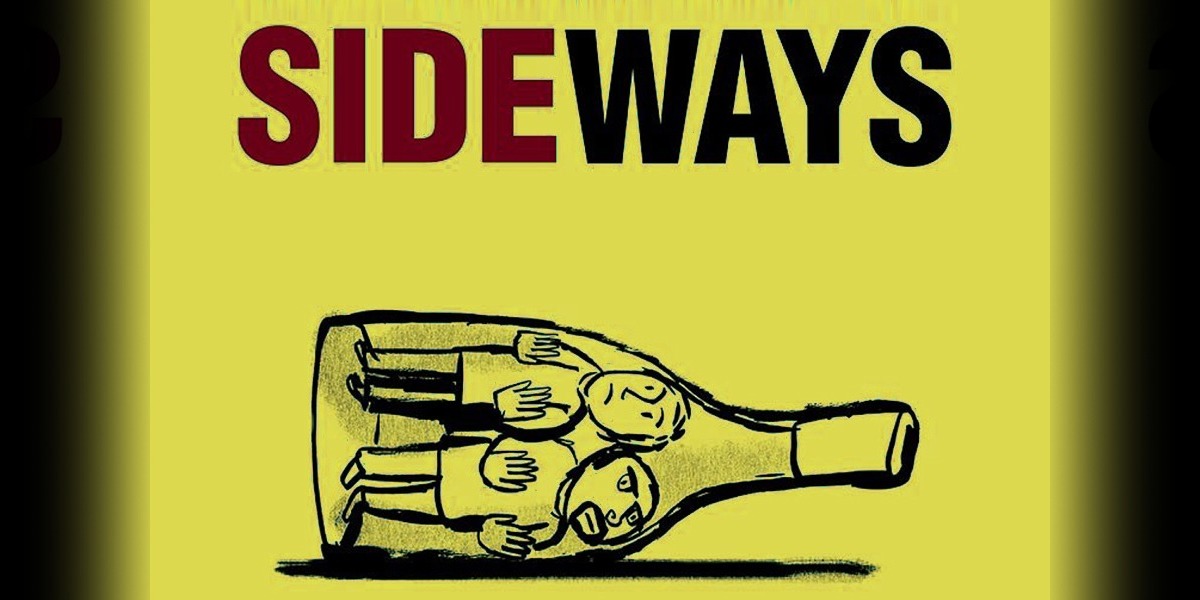Part III: My Life on Spec: The Writing of Sideways
 Richard "RB" Botto
Richard "RB" Botto
Tom Petty once sang, "The waiting is the hardest part." Any creative can relate. We've all been there, staring at the phone, willing it to ring – the producer, your agent, the callback. The days feel like weeks…the weeks, years. Confidence wanes, doubt blooms, and sometimes, at your weakest, success brushes by you and saddles up next to a colleague.
What's that they say about handling adversity?
As we enter the third of our exclusive six part series, Rex's agent loves his latest manuscript, but his ex-wife loathes it, suggesting he "burn it." Amazingly, this isn't the worst of it. As the skies grow ever darker, how will respond? Will he trust his instincts or let outside opinions dictate?
-- RB
Looking back, I think the raw, personal subject matter – especially given that it was a roman-a-clef of sorts and the undisguised fact that she was a character, if in absentia – must have been hard for her to swallow.
I was devastated. Was Jess that wrong? Barbara augured it was going to end my career. I reminded her that I had no career! I argued that I had no choice but to go out with it and test the waters, I so desperately needed something, anything, to happen. Realizing that I wasn’t going to “burn it,” she decided the next best course of action was to help me whip it into shape, turn a proverbial sow’s ear into a silk purse, as it were.
A week or so later we met at the house we had shared while making our second indie feature. We sat down and she slowly leafed through the pages on her now heavily marked-up copy of my manuscript, stopping here and there to expound on her notes. The more critical editorial chicken scratch I saw on the pages, the more dispirited I became. It seemed to confirm all my fears when I gave the book to Michael because I was too afraid to give it to Jess first. It was a total piece of shit; they were wrong, Barbara was right! It was unsalvageable. When Barbara, still trying to be helpful, came to the scene where Miles and Jack go back to the waitress’s house in Lompoc to retrieve Jack’s wallet – the infamous “naked man” scene in the movie – she had scrawled a gigantic X through every single page of the scene, a scene that was lifted virtually intact from the novel in the eventual movie.
That was it; that was the coup de grace. I had been trying to wrap my head around a rewrite vis-à-vis her notes, but cutting that scene, one of my favorites when I was writing it, that was too much. If she hated it so much, and it had to go in her estimation, I didn’t want to go out with my book. I remember feeling bottomlessly depressed after our “story-editing” session. Barbara tried to be upbeat about the book’s prospects, despite her earlier blanket condemnation. She knew how much this meant to me, and because she’s a normally positive person, despite her trenchant critical sensibility, she tried to leave on an upbeat note; i.e., if I incorporated her changes the novel would have a better chance of success.
That was no consolation to me. The high I had experienced writing Sideways had now been seriously dampened, deflated; no, annihilated. I took her criticism seriously, but we were worlds apart on Sideways. It was as if we were seeing it through completely diametrically opposed viewpoints, mediated through totally bifurcated sensibilities. Worse, it was as if a line had been drawn in the sand. Jess’s enthusiasm; Barbara’s denunciation.
I was in a daze. A quandary. Did I tell Jess and Michael what Barbara -- they both knew, and respected, her -- opined? Prepare them for months of rewriting before we could go out with it? Or did I reject her criticism wholesale and cede to their wishes? Barbara’s words were not so easily dismissed by me back then. We had made two features and written numerous scripts together, and I instinctively trusted her opinion. Wrong or not, that’s how much sway she held over me. That’s how much she had colonized my creative unconscious.
In despair over what course of action to take, I sort of disappeared within my own world. I wandered the streets of Santa Monica, ensconced myself in movie theaters, refused to return phone calls – and it’s usually not a good idea to not return calls from your agents. The messages on my answering machine inquiring about my whereabouts grew increasingly desperate-sounding. I had slipped into a bottomless depression about the book, about my life. I didn’t want to go out with a manuscript that was going to destroy my “career,” but then the angel on the other shoulder reminded me: you really don’t have any other choice. La Purisima wasn’t selling, I had no other projects on the horizon, and my brother, and Barbara, and her sister were getting tired of loaning me money. Back and forth I seesawed. And further into the abyss of my despond I sank.
I finally somehow hoisted myself out of my self-imposed exile and called Jess, apologized for being MIA and confessed I had slumped into a “funk” over Barbara’s reaction to the manuscript. After apologies were accepted, we hashed over Barbara’s reservations. He argued emphatically, and persuasively, that she was dead wrong, that it was a good book, a funny book, the kind of book that had movie written all over it. Jess vs. Barbara. Jess won. Well, desperation born of destitution and a life of writing hanging in the balance won. If I had had any kind of future, Barbara very easily might have won. And there would have been no Sideways.
Sometime around late October we -- Jess from Endeavor and Mitchell Waters, my new publishing agent, of Curtis Brown, Ltd. -- went out with Sideways to both film and publishing respectively. The early word back from publishing was, to say the least, not encouraging. The rejection letters were excoriating, vitriolic – as if I had committed some kind of literary crime and should be pilloried and have my WGA card impounded. One nasty senior editor at a major house wrote that it was “a dirtbag assemblage of juvenile antics that would never see the light of print.” And that was one of the kind ones. My book agent immediately pulled the manuscript, not wanting to further “stink up the publishing world.” He urged me to do some rewriting, but, as is common with both publishing and film agents these days, he had no constructive criticism on that proposed rewrite. Max Perkins, where are you?
In the film world you don’t get rejection letters on submissions and your agent doesn’t feel the need to report all the “passes.” But, it was growing evident that Hollywood didn’t know what to make of Sideways. At the handful of film development companies where Jess and I allowed Michael to be attached, there was no interest. Jess’s wider range of submissions continued to fall on deaf ears. It was dead in New York, and now moribund in L.A.
One of Jess’s submissions, however, was a walk down the hall at Endeavor to David Lonner’s office. Lonner, one of the partners at Endeavor, and a relatively powerful agent, represented Alexander Payne. Election, Payne’s second feature, had just been released the previous spring and though the film didn’t do all that well commercially – bad marketing campaign was the excuse – it was a critical hit and the relatively young Payne was now a force to be reckoned with in Hollywood. In short, he had what every film director would like to have: greenlighting power.
Jess remembers ardently pitching Lonner, saying that his client had to read Sideways, that he thought Payne’s acerbic, satiric wit would be a perfect fit for it. And Jess remembers Lonner, in a moment of agent grandiloquence, informing Jess that they – he and Payne – were looking for something big. However, he accepted the unpublished manuscript and set it on top of a huge pile of submissions which were now pouring in.
Backing up a tad: In the mid ‘90s, Barbara, after weathering three soul-destroying years in film development, decided to enroll in the prestigious director’s program at the American Film Institute. Only 25 out of 1,500 applicants were accepted. The first year they were required to make three short films on, then, videotape. I wrote all three of her shorts. The third one was an adaptation of a Charles Baxter short story titled Griffin, and it turned out to be a terrific little film, good enough to get her selected as one of five directors to do a thesis film. She chose a 35-page script I had written as an exercise in four days titled My Mother Dreams the Satan’s Disciples in New York. It took over two years to make it, and is another story in itself, and it was completed just about the time I was getting ready to go out with Sideways and soliciting her opinion.
The first short film festival -- Turin, Italy, I think -- that Barbara’s AFI short was entered in won the Grand Prize for best short. I remember Barbara calling from Italy to tell me the news. The bad news on Sideways was somewhat mollified by the news of her success. Still, it was only a small festival in Italy somewhere and I doubted it would register on the Hollywood radar.
About five months into the submissions and rejections pouring in on a daily basis, early enthusiasm getting chopped off at the knees with each pass or official rejection letter, I was invited to a book signing of a novelist client of Jess’s. I remember not wanting to go because I would feel obligated to buy the guy’s book, and I didn’t have the money, nor did I much care for his slick genre writing. But, I reasoned, it would be a good time to talk with Jess and re-strategize about our next move with the Sideways manuscript.
As I stood in the audience of 50-some-odd attendees, listening to the author drone on reading the first, cripplingly boring, chapter of his novel I caught Jess’s eye. His head was hung low and he seemed in a pensive move. After the author was mercifully finished and friends and family and fans lined up for him to sign his latest, Jess sidled over to me. After exchanging hellos he said in an undertone: “I’m leaving the business.”
I was so stupefied by his announcement that I don’t remember much of what we talked about afterward. I drove home feeling like this time it was all over. Without Jess I was, once again, agent-less in Hollywood, a dim hope that Sideways would ever sell, least of all become a movie.
A few days later I met Jess on a gloomy, saturnine-sky day in Beverly Hills. We talked about what would happen – not much, it appeared – and then I escorted him to his psychiatrist’s office down the block. He was moving in a very slow, hitching kind of walk, the walk of a man who had had his soul crushed by the power brokers of Hollywood, the sad shuffle of failure. The irony wasn’t lost on me as I drove home that, traditionally, it should have been the reverse. But then I couldn’t afford a therapist, so it was a moot point.
The ensuing months were bleak. The new roommate I had let the spare room to had lied about being employed. He had gone on a tequila bender and was bringing this stripper/hooker/junkie over for all night fuck fests. I couldn’t sleep. I was going crazy. My brother and my ex-wife’s sister were continuing to support me in dribs and drabs, but I was barely making ends meet, while dodging creditors. After two successive epigone novels I had lost the desire to write. I fantasized getting in my car and driving to Jalama Beach where my mystery novel La Purisima opened and living out of a tent until cold and starvation mercifully took me.
Barbara kept winning film festivals with My Mother Dreams… but it wasn’t much of a consolation for the desolation and destitution that I now faced. Sideways had been officially “retired” in NY and was no longer being pushed around Hollywood. For all intents and purposes it was dead. Was Barbara right after all?
---
In Part IV of Stage 32's exclusive series, Rex gets a break…and then he doesn't…and then he does, sort of, again. And Sideways is finally published…in Japanese.
 Part IV will be posted Thursday, December 15th. In the meantime, we invite all Stage 32 members to leave comments on the series. Or ask Rex a question. He'd love to hear from you!
Part IV will be posted Thursday, December 15th. In the meantime, we invite all Stage 32 members to leave comments on the series. Or ask Rex a question. He'd love to hear from you!
Thanks!
-- RB
| Part IV: My Life on Spec: The Writing of Sideways |
| Part II: My Life on Spec: The Writing of Sideways |
Search Stage 32 Blog
There are now 4035 blog posts for you to enjoy. Search them all by tags below.
Acting, Advice, Cinematography, Coffee & Content, Composing, Contests, Distribution, Featured, Filmmaking, Financing, Inspirational, Networking, Producing, Screenwriting, Success Stories, Tips, Trending,Relevant Tags
Recommended Articles

Stage 32 + DramaBox Join Forces to Launch World's First Vertical Drama Incubator

Coffee & Content: The Genius of Weapons and How to Know When Your Script Is Ready

Insider Intel: 2026 Predictions

Insider Intel: The Studio War & The Rise of Indies

Want Success in the Entertainment Industry? Start Writing Your Own Narrative

Stage 32 Now Certifying Centro de Portugal Film Commission!

Insider Intel: A-listers Are Dead. Long Live A-listers.

What Stage 32's Community Is Really About (Beyond Scripts, Sets, and Showreels)

Green Lights and Grey Areas: Expanding Creative Collaboration in Publishing





 as well if you haven't read that yet. Both make excellent stocking stuffers for the "Sidways" fan in your life.
as well if you haven't read that yet. Both make excellent stocking stuffers for the "Sidways" fan in your life.


